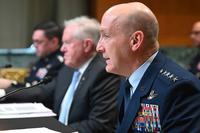We saw this week where two of the Building's top Air-Sea gurus made sure they included a shout-out to land power in their most recent explanation about DoD's concept of tomorrow.
But Army Chief of Staff Gen. Ray Odierno did not mention "Air-Sea Battle" in a speech Thursday in London, where he addressed the Royal United Services Institute. Instead, he suggested the Army could contribute to the U.S. "rebalancing" toward the Western Pacific on its own terms.
You'll see how Odierno used concepts and terms we've come to associate with Air-Sea, but without an explicit mention of the Navy or Air Force, suggesting they're as important to the green services as they are to as the blue ones.
Said Odierno:
One of the things we talk about as we look to the future is the importance of the interconnected global commons. Every country in the world wants to have access to it. For many years, the global commons was defined as air, land, and sea. But over the last several years, and it has expanded dramatically, we have seen dramatic technological advancements that have expanded the global commons to space and cyberspace, and how we manage information in cyberspace.Having access and the ability to protect ourselves in these domains will influence the nature of conflict in the future. We cannot ignore these new domains. We must incorporate them into our planning, thinking, and how we execute future military operations. Some argue that cyberspace and information operations might be a new form of maneuver. What we do know is that today and into the foreseeable future, uncertainty will characterize the global environment.
Quite. So how could the Army go marching along in a part of the world characterized by its unbroken stretches of air and water? Odierno said that the key countries in the region speak army, for lack of a better term, and that means the U.S. Army must be a part of the American forces ready to deal with them.
The Army has a critical role in the Asia-Pacific, as 7 out of the 10 largest land forces in the world are in this region. 22 out of 27 of the Chiefs of Defense are [in] the Army. We've ignored that region for years because of our other commitments. The dominant service in every country is Army. We will build on the strong foundation of strategic partnerships with our allies and partners, while also seeking opportunities to engage in new relationships. We will do this while maintaining our focus in the Middle East, and sustaining and reinforcing our partnerships in NATO, Africa and South America.
What does that mean?
We must build on the strong and successful integration of conventional and special operations forces that we have learned over the past ten years. We must maintain and improve our ability to deploy diverse force packages quickly, whether regionally or internationally. We must ensure the robustness and agility of our Brigade Combat Team. Finally, we must employ our forces to shape the regional environments in support of our geographic combatant commanders.
Still, did not spell out what that means specifically for the Army. The Western Pacific does not seem like its natural habitat. Where ground forces are concerned, it would appear much better suited to the Marines, who can suddenly appear off your coast one morning aboard Navy warships, stay as long as they want, and then disappear just as quickly. Even today's modular Army brigades take a long time to get into place and need a long time to get home.
Moreover, even with Washington's official reticence to talk in detail about its worries for the Western Pacific, does it seem a likely venue for a land war? Joint Chiefs Chairman Gen. Martin Dempsey on Thursday praised the role of the special operations forces that work with Philippine troops to keep stability on the island of Mindanao, but that's only a few hundred people. What scenario in the Western Pacific might call for a deployment of regular Army combat units?
We don't know, Odierno might say -- but the point is, the Army's got to be ready.








